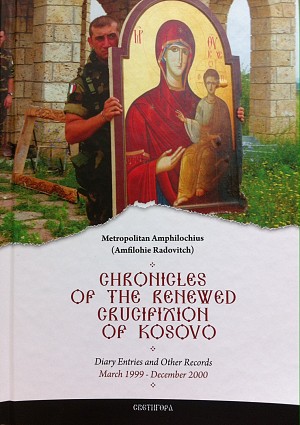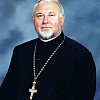IN MEMORIAM
I was deeply saddened to hear of the death of Metropolitan Amfilohije whom I got to know during my visits to Montenegro and later in Belgrade after the bombing. We became friends and he asked me to write the foreword to the English edition of his book "Chronicles of the Renewed Crucifixion of Kosovo". I was honoured to do so because the book was desperately needed to be read, not only by Serbs, but more importantly, by non-Serbs who have been misled by the lies told by the NATO countries about what really took place after the NATO forces entered Kosovo. Metropolitan Amfilohije Radović was an outstanding man, a brilliant scholar, an eminent statesman, a fierce and courageous defender of his country and his Serbian Orthodox faith. As my tribute to this great man I hope that this foreword to his book may give the reader an indication of his devotion to his faith and love of his native land.
***
The twentieth century has not been kind to Serbia or to the Serbian people. Wars and suffering have plagued the nation for the best part of the century. Yet it was not until the last decade - the 1990s - that Serbia was caught up in events that were destined to bring the nation to its knees, and threatened to break the proud spirit and heroism of its people. In March 1999, the country was subjected to a massive, 78-day bombing campaign by the countries of the North Atlantic Treaty Organization (NATO). Only Greece, Serbia’s traditional ally, refused to participate in this illegal and outrageous act of aggression by the so-called democratic nations of North America and Western Europe.
The bombing was justified by the perpetrators on the grounds of the alleged need to stop Serbia from committing genocide and ethnic cleansing of its Albanian population in the Serbian province of Kosovo and Metohija. It followed a highly organized public relations campaign to portray the Serbian leader Slobodan Milosević, and the Serbian people as a whole, as murderous barbarians. In reality, the bombing had nothing to do with “genocide” or “human rights violations” in Kosovo and Metohija. Such trumped up excuses were used to demonstrate to an increasingly sceptical domestic audience that NATO still had a vital role to play, despite the fall of the Berlin Wall and the disintegration of the Soviet Union. Incredible as it may seem, the propaganda machine of the NATO countries succeeded in convincing a large segment of the global public opinion that the lies told by NATO leaders were true.
The bombing restored NATO’s raison d’etre, but more significantly, it had also established the precedent that NATO could intervene militarily to resolve international disputes without obtaining prior United Nations Security Council authorization. Once again, great powers had achieved an important goal at the expense of the destruction and demonizing of a smaller one - in this case, Serbia. There remained one other goal to be achieved, and that was removing Kosovo and Metohija from Serbia and handing that territory over to the Albanians.
United Nations’ Resolution 1244 that had ended the conflict had also reaffirmed Serbia’s sovereignty over Kosovo and Metohija. This was an embarrassing obstacle that had to be overcome if Kosovo and Metohija were to be given to the Albanians. The problem was solved by simply ignoring the UN ruling and ensuring that the Serbian population was forced to leave - a classic example of cynical power politics in operation.
Some years later, in February 2008, under United States’ guidance, the Albanian leaders in Priština unilaterally declared Kosovo’s independence. The self-proclaimed state was immediately recognized by the United States and by most of the other NATO countries, and thus the violation of Serbia’s sovereignty was brought to a new level. Adding insult to injury, the United States has waged a powerful lobbying campaign urging other nations to recognize Kosovo’s independence. Of the 193 UN member states as of 2014, there remain 86 countries that have refused to do so. Nevertheless, de facto independence seems to have been secured. What has been overlooked is the price that has been paid for this violation of international law and the United Nations Charter.
The price has not only been that NATO’s action in bombing Serbia and violating its territorial integrity has broken the framework of international peace and security that has existed since the end of the Second World War, but it also has been done at a terrible cost in human suffering and misery.
The bombing of Serbia itself was designed to destroy the economic infrastructure of the country. It was carried out without regard to civilian casualties. Hospitals, bridges, passenger trains, television stations, apartment blocks, tractor convoys of people fleeing the bombs, market places during busy hours, they were all hit. Even the Chinese embassy was targeted. Cluster bombs were commonly used as anti-personnel weapons, and their existence continues to present a threat to children to this day. Bombs and rockets containing depleted uranium were also extensively used during the 78 days and nights of the bombing campaign. Ironically, as was later disclosed despite the boasts of NATO senior generals, very few military targets were hit. But it was what happened in Kosovo after the conflict ended where the real tragedy quickly unfolded.
The bombing of Serbia and Montenegro could not be hidden and the damage and the human casualties could be calculated, recorded and publicized. Loved ones could be identified and given a Christian burial. Grave sites could be visited and the dead afforded traditional rites. This was not true in Kosovo and Metohija, because a genocide was perpetrated there. In Kosovo and Metohija something extraordinarily evil took place. In Kosovo and Metohija old people and the young were slaughtered, but unlike in Serbia the horrors committed there would have gone unreported and unrecorded if it were not for the courageous actions of the Orthodox clergy.
This book written by His Eminence Metropolitan Amfilohije sets out in chronological order the grim events that took place during the occupation by NATO troops after the Serbian military withdrew from Kosovo and Metohija, and the Albanians who had fled the bombing returned. It reports events as they unfolded on a month-by-month basis, beginning in March 1999, and continues through the year 2000. As described by Metropolitan Amfilohije in his own words, it is a horrific narrative of an “uninterrupted chain of violence, expulsion, abduction and destruction.”
Immediately after and often during the withdrawal of the Serbian army, the pillaging and murdering of the civilians left behind began. Serbian houses and apartments were broken into, and their inhabitants either killed or turned out and forced to flee. Churches and monasteries were routinely burned or destroyed by dynamite. At great risk, the clergy made every effort to find and to identify the murdered men and women.
Metropolitan Amfilohije asks forgiveness for being unable to find or recover all of the victims. Many of the murdered were buried in unknown graves or disposed of in abandoned areas. They are, as the Metropolitan has said, “known only to God.” However, this book is living testimony to the incredible efforts made by the Serbian Orthodox Church to identify and record the names of the Serbs, the Roma, and other victims of this shocking episode of the mass killing of innocents.
The role played by the Orthodox clergy throughout the history of Serbia is one of sturdy patriotism in the face of hardship and danger. What was done in Kosovo and Metohija by members of the Orthodox clergy during the Kosovo holocaust will rank as one of the most heroic chapters in that illustrious story. It must also be said the clergy were acting on their own - aided only by their powerful Christian faith, and by the sense of duty to their flock. Little if any support was forthcoming from government sources in Belgrade, and none at all from the international community.
Their attempts to enlist the support of the NATO military to save people who were in immediate and mortal danger were more often than not ignored. Their pleas to senior members of the United Nations Mission in Kosovo to restore peace and order to the province, and to offer protection to the non-Albanian population were not acted upon. The killing, burning, abductions, confiscation and looting of property continued under the watchful but indifferent eyes of what was, with cruel irony, named the Kosovo Protection Force (KFOR).
Time and time again, as the Metropolitan has testified, efforts were made at meetings, conferences, and in written form to seek some form of acknowledgement that heinous crimes were being committed - but to no avail. It seems evident that NATO commanders and United Nations personnel were in Kosovo and Metohija as accessories to see to it that the non-Albanian population fled their homeland. Their behaviour, and their refusal to enforce the law, in practice translated into aiding and abetting the crimes being committed on a daily basis. United Nations Resolution 1244 that called for the return of all refugees was studiously ignored.
There are many individuals who bear a terrible responsibility for the horrors that took place in Kosovo and Metohija in the aftermath of the armed conflict between the Serbian security forces and the self-styled Kosovo Liberation Army. In the foremost ranks are the political leaders of the United States, Great Britain, France, and the other NATO countries that took part in the bombing of Serbia and played a role in the occupation of Kosovo and Metohija. Some of their names stand out: President Bill Clinton, Madeleine Albright, Wesley Clark, Richard Holbrook, Tony Blair, Robin Cook, and Paddy Ashdown. There are many more names to be added to this list, but it is not only political leaders who must accept blame for what happened in Kosovo. The role of the mainstream media in Europe and North America cannot be overlooked.
From the outset of the wars following the break up of Yugoslavia, the western media played a primary role in deliberately misrepresenting what was really taking place on the ground and in portraying Serbia and the Serbs as responsible for most, or even all of the crimes committed, and all of the wickedness that occurs in wartime. No other war has been so falsely reported and no other people so irresponsibly depicted as collectively guilty.
Notwithstanding the enormity of the crimes committed by the Nazis in the Second World War, there was a careful delineation made by the media to avoid the charge of collective guilt. “All Germans were not Nazis” was the watchword. Not so with Serbs - even today much of the media stories that mention Serbia or Serbs continue to malign both the country and its people as ethnic cleansers and murderers. This, in the final analysis, is the greatest crime against Serbia - and will be the most difficult one to overcome
It cannot be done quickly, but over time the truth of what really happened in the Balkan wars of the 1990s will emerge. Truth eventually triumphs.
A recent example of this is the confession of Italian general Mauro Del Vecchio in an interview he gave in February 2014 to the magazine “Panorama”. The general was in command of 7000 Italian troops that entered Kosovo and Metohija in June 1999. He said that reports from his soldiers arrived every morning on his desk, notifying of dead bodies of Serbs and Roma, but he was not allowed to speak about this. He added that those non-Albanians who had not fled Kosovo were under permanent threat of being raped or killed. He spoke of houses being destroyed and churches and monasteries being mobbed by gangs of Albanians. The general said, “Their goal was to erase every trace of the Serbian presence in Kosovo.”
There is hope that more of the men and women who bore witness to the events that took place in Kosovo and Metohija will speak up, and that in an effort to clear their consciences they will tell the truth about those dreadful months. Nevertheless, it will be up to a new generation of Serbian historians and scholars to set the record straight. The first steps in this direction are to be found in the content of these “Chronicles of the Crucifixion of Kosovo” by Metropolitan Amfilohije.
This book stands out as a remarkable account of a shameful episode in the history of the last decade of the twentieth and the first decade of the twenty-first century. The story has not ended, and the work of the Metropolitan will be continued. Serbia and the Serbian people will once again regain their self-respect and confidence. These “Chronicles” should serve as a “book of martyrs” whose suffering will act as a beacon to future generations of young men and women of Serbia to ensure that nothing like it will happen again.
James Bissett was Canada’s ambassador to Yugoslavia, 1990-1992.
|
| |||||||||||||





